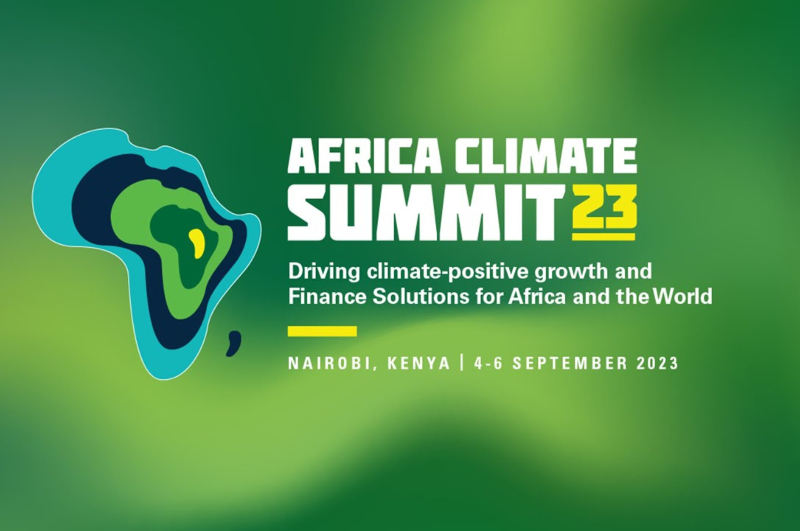

The Africa Climate Summit, a historic event inaugurated this week in Nairobi, has seen a congregation of national leaders, global climate champions, and esteemed civil society members coming together to deliberate on Africa's growing vulnerability to climate change.
As part of this congregation, The Jesuit Justice and Ecology Network - Africa (JENA) remains steadfast in its commitment to advocating for a just, sustainable, and compassionate response to the climate crisis.
Though Africa has borne a significant burden of the climate crisis, it is encouraging to see the continent hosting such a pivotal summit. JENA wholeheartedly applauds this initiative. While we at JENA deeply appreciate such high-level regional dialogues, the persistent gap between commitments and action remains a grave concern. We remain acutely aware that while the world possesses the requisite financial, technological, and intellectual resources to combat the escalating climate crisis, often the essential action is not being taken.
Highlights of the Africa Climate Summit:
The maiden Africa Climate Summit has unveiled a broad agenda, from green growth and climate finance solutions to the creation of sustainable and integrated African cities. These measures align with the imperatives of our time. However, true progress can only be made when decisions are not driven solely by self-interest, but by compassion and consideration for our common home and for the most vulnerable among us.
Goal-Oriented Approach: One of the principal aims of this summit is to curate climate commitments, pledges, and outcomes, culminating in the Nairobi Declaration, envisioned to be a roadmap for Africa’s transition to green energy. The summit also seeks to project a unified stance ahead of the forthcoming COP28 summit.
Diverse Participation: The impressive lineup of attendees, from at least 20 heads of states to the likes of UN Secretary-General Antonio Guterres and US climate envoy John Kerry, denotes the significance and urgency of this event.
Core Panels: Discussions on climate finance, integrating nature and biodiversity solutions, and the vision for sustainable African cities are slated to be pivotal.
Dissonances and Concerns:
The summit has not been devoid of controversies. The underrepresentation of indigenous African perspectives in favor of Western-oriented agendas is a pressing issue. The overwhelming emphasis on carbon markets and ‘climate positive’ approaches, while seemingly solution-oriented, often serve the interests of wealthy nations and big corporations, perpetuating the climate injustice Africa faces.
Moreover, discrepancies in commitments by African leaders, like the recent lifting of the logging ban by Kenyan President William Ruto, indicate the complexities and challenges inherent in the path toward holistic climate action.
As noted already, a consistent concern, voiced by many including JENA, is the disproportionate influence of Western interests. The summit, while it marks a significant stride, needs to ensure the primacy of African voices and priorities. The continent’s environmental and economic challenges deserve solutions rooted in local contexts and knowledge, rather than merely echoing the dictates of foreign powers or corporate entities.
The African Climate Summit stands as an opportunity to bridge the yawning gap between rhetoric and action. JENA aligns with the sentiments expressed by the Pan African Climate Justice Alliance and the myriad African civil society groups demanding genuine representation and the prioritization of Africa's needs. True change can only materialize when the commitments, like those proposed in the Nairobi Declaration, are infused with authenticity, empathy, and an unwavering moral compass.
Our participation in the summit reaffirms our unwavering commitment to an ecology-centric justice system, one that aligns with the teachings of our faith and Pope Francis’s vision. As stewards of Earth, we continue to pray, hope, and work towards a brighter, more sustainable, and just future for Africa and the world.
Related Articles
Select Payment Method
Pay by bank transfer
If you wish to make a donation by direct bank transfer please contact Fr Paul Hamill SJ treasurer@jesuits.africa. Fr Paul will get in touch with you about the best method of transfer for you and share account details with you. Donations can be one-off gifts or of any frequency; for example, you might wish to become a regular monthly donor of small amounts; that sort of reliable income can allow for very welcome forward planning in the development of the Society’s works in Africa and Madagascar.
Often it is easier to send a donation to an office within your own country and Fr Paul can advise on how that might be done. In some countries this kind of giving can also be recognised for tax relief and the necessary receipts will be issued.


